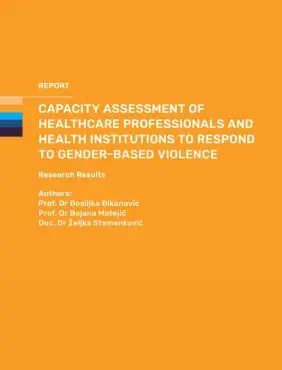Health institutions are often the first and sometimes the only institutions to which gender-based violence (GBV) survivors, most often women of all ages, turn to. The focus then is on attending to their health-related needs, whereas exposure to violence easily goes unrecognized and unaddressed. Lack of communication about violence represents a missed opportunity to assist survivors and create a supportive environment, which would also make a difference in the overall social response to violence. Healthcare professionals have a professional duty to protect violence survivors in an adequate way, which requires multi-faceted professional competency.
Since 2015, the United Nations Population Fund Country Office (UNFPA CO), in cooperation with the Ministry of Health (MoH) and the professional team gathered around the partner organization, the Women’s Health Promotion Center, has been providing continued support in building the capacities of the health sector to respond to GBV.
Since 2016, these training have been organized as part of UNFPA activities within the Joint Project on Integrated Response to Violence against Women and Girls in Serbia (Phase II and III), implemented by the Government of Serbia with UN Agencies, and supported by the Government of Sweden.
During the current, Phase III of the Joint Project, and with the aim to further strengthen the capacities of the healthcare system to respond to violence against women and girls (VAWG), including new challenges in the context of the COVID-19 pandemic, UNFPA in Serbia seeks to:
- Conduct a detailed assessment of the current capacities and needs of health professionals/institutions to respond to GBV at the national level;
- Map key challenges faced by healthcare professionals in identifying GBV and providing comprehensive support to GBV survivors, including during the COVID-19 pandemic;
- Identify key factors contributing to successful GBV response by health institutions; and
- Assess the existing models of supervisory and other forms of support available to healthcare professionals in responding to GBV.
Who we are
What we do
Capacity Assessment of Healthcare Professionals and Health Institutions to Respond to Gender-Based Violence

Publisher
Number of pages
84
Author
Bosiljka Đikanović, Bojana Matejić, Željka Stamenković
Publication
Capacity Assessment of Healthcare Professionals and Health Institutions to Respond to Gender-Based Violence
Publication date
06 April 2023

